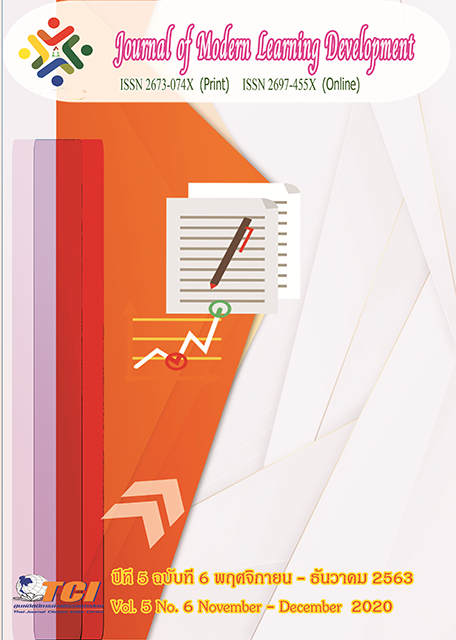ความรับผิดชอบต่อสังคมและสิ่งแวดล้อมเพื่อคืนกำไรสู่สังคมของ บริษัท ทรูคอร์ปอเรชั่นที่มีต่อด้านการศึกษา
Main Article Content
บทคัดย่อ
การวิจัยเรื่องนี้มีวัตถุประสงค์ เพื่อศึกษาวิธีการดำเนินงานโครงการเกี่ยวกับความรับผิดชอบต่อสังคมของบริษัท (CSR) ที่มีต่อด้านการศึกษา โดยใช้ระเบียบวิธีวิจัยเชิงคุณภาพด้วยการวิจัยเอกสาร และวิธีการสัมภาษณ์ผู้ให้ข้อมูลสำคัญ คือ ผู้บริหาร จำนวน 2 คน พนักงานบริษัทฯ จำนวน 4 คน ประชาชนผู้มีส่วนได้เสีย จำนวน 6 คน รวม 12 คน โดยใช้เทคนิควิธีการเลือกแบบเจาะจง
ผลการวิจัย พบว่า การดำเนินการด้าน CSR ของบริษัทฯ ที่มีต่อด้านการศึกษาประกอบไปด้วย 7 ประการ คือ 1. นโยบายการกำกับดูแลองค์การที่ดี 2. การวางแผน 3. การมีส่วนร่วม 4. กิจกรรม บริษัทฯ มีกิจกรรมที่ดำเนินการในปัจจุบันอยู่ 2 ลักษณะสำคัญด้วยกัน คือ 1) กิจกรรมที่ทำให้องค์กร สมาชิกขององค์กร เกิดความสัมพันธ์ในรูปแบบใหม่กับชุมชนหรือสังคมที่องค์กรตั้งอยู่ คือความสัมพันธ์บนฐานผลประโยชน์ร่วมกันในฐานะสมาชิกของชุมชนหรือสังคมเดียวกัน ไม่ใช่ความสัมพันธ์ในฐานะผู้ให้บริการลูกค้า เช่น โครงการ “3G+ เพื่อโรงเรียนและชุมชน” เป็นต้น และ 2) กิจกรรมที่นำให้องค์กรและสมาชิกขององค์กร เป็นส่วนหนึ่งของชุมชนหรือสังคม เช่น โครงการเปิดโลกทัศน์การเรียนรู้สู่โรงเรียนทั่วประเทศ ทรู ปลูกปัญญา และทรูconnet ED เป็นต้น 5. การส่งเสริมประเด็นให้รับรู้ในวงกว้าง 6. การเชื่อมโยงประเด็นกับการตลาด บริษัทฯ นำส่วนหนึ่งของรายได้หรือกำไรจากการจำหน่ายสินค้าหรือบริการไปบริจาคเพื่อสาธารณกุศล และ 7. การอาสาช่วยเหลือชุมชน บริษัทฯ เปิดโอกาสให้พนักงานได้เป็นตัวแทนของบริษัทฯ เข้าไปทำหน้าที่ของพลเมืองดีในชุมชนและโรงเรียนได้อย่างใกล้ชิด
Article Details
เอกสารอ้างอิง
กลุ่มพัฒนาระบบบริหาร สำนักงานคณะกรรมการพัฒนาระบบราชการ. (2552). ความรับผิดชอบต่อสังคม CSR: Corporate Social Responsibility. กรุงเทพมหานคร: ก.พลพิมพ์ (1996).
คณะทำงานจัดทำแผนบริหารความต่อเนื่องของ ทร. และแผนความรับผิดชอบต่อสังคมของ ทร. (ม.ป.ป.). แนวทางความรับผิดชอบต่อสังคมของกองทัพเรือ. ออนไลน์. สืบค้นเมื่อ 22 พฤศจิกายน 2563. แหล่งที่มา http://www.onc.navy.mi.th/files/guideLine.PDF
จีรพัฒน์ศิริรักษ์ และชไมพร ใจแปง. (2558). ความรับผิดชอบต่อสังคม (CSR) พฤติกรรมที่พึงประสงค์ในองค์กร. ออนไลน์. สืบค้นเมื่อ 12 พฤศจิกายน 2563. แหล่งที่มา https://vijailp.blogspot.com/2015/03/csr.html
ปรีดีนุกุลสมปรารถนา. (2563). รู้จักประเภทของกิจกรรมเพื่อสังคม (CSR). ออนไลน์. สืบค้นเมื่อ 21 พฤศจิกายน 2563. แหล่งที่มา https://www.popticles.com/branding/types-of-csr/
ผู้จัดการออนไลน์. (2562). “ทรู”รับโล่ “ผู้มีคุณูปการต่อการศึกษาไทย”โครงการ CONNEXT ED. ออนไลน์. สืบค้นเมื่อ 21 พฤศจิกายน 2563. แหล่งที่มาhttps://mgronline.com/cyberbiz/detail/9620000112242
มยุรฉัตร สุขดำรงค์. (2547). ปัจจัยทางจิตสังคมที่เกี่ยวข้องกับพฤติกรรมการทำงานสินเชื่ออย่างมีความรับผิดชอบของเจ้าหน้าที่สินเชื่อ บมจ. ธนาคารกรุงไทย. ปริญญานิพนธ์วิทยาศาสตรมหาบัณฑิต สาขาการวิจัยพฤติกรรมศาสตร์ประยุกต์. บัณฑิตวิทยาลัย: มหาวิทยาลัยศรีนครินทรวิโรฒ.
ยุพาพร รูปงาม. (2545). การมีส่วนร่วมของข้าราชการสำนักงบประมาณ ในการปฏิรูประบบราชการ. ภาคนิพนธ์ศิลปศาสตรมหาบัณฑิต: สถาบันบัณฑิตพัฒนบริหารศาสตร์.
วิฑูรย์ สิมะโชคดี. (2553). ที่มาที่ไปของ CSR. ออนไลน์. สืบค้นเมื่อ 11 พฤศจิกายน 2563. แหล่งที่มา http://www.tpa.or.th/tpanews/upload/mag_content/36/ContentFile542.pdf
Kruneung. (2560). การรับผิดชอบต่อสังคม (CSR: Corporate Social Responsibility) ในแบบที่เข้าใจง่าย ๆ. ออนไลน์. สืบค้นเมื่อ 19 พฤศจิกายน 2563. แหล่งที่มา https://kruneung2020.blogspot.com/2017/10/csr-corporate-social-responsibility.html
Worapat, M. (2012). ความเป็นมาของ CSR และการนำไปใช้. ออนไลน์. สืบค้นเมื่อ 18 พฤศจิกายน 2563. แหล่งที่มา https://www.gotoknow.org/posts/498598


